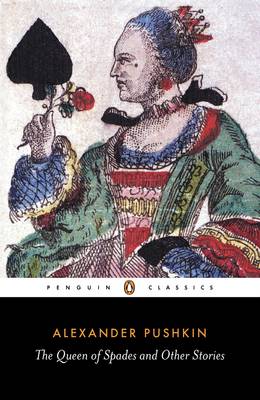Disclosure : This site contains affiliate links to products. We may receive a commission for purchases made through these links.
The Queen of Spades and Other Stories

The “Queen of Spades and Other Stories” is a collection of short fiction showcasing Alexander Pushkin`s application of Romantic sensibilities to uncompromising studies of human frailty. This “Penguin Classics” edition is translated with an introduction by Rosemary Edwards. “The Queen of Spades”, one of Pushkin`s most popular and chilling short stories, tells of an inveterate card player who develops a dangerous obsession with the secret of an old lady`s luck, which he believes will bring him the wealth he craves. “The Negro of Peter the Great”, a story based on the life Pushkin`s own great-grandfather, is a vivid depiction – and criticism – of both French and Russian society, while “Dubrovsky” is the Byronic tale of a dispossessed young officer. “The Captain`s Daughter” tells of a young man sent to military service – based on the actual events of the rebellion against Catherine II, it demonstrates Pushkin`s unparalleled skill at blending fiction and history. Together these four stories display the versatility and innovation that earned Pushkin his reputation as a master of prose and established him as the towering figure in Russian literature.Rosemary Edmonds` translation is accompanied by an introduction examining Pushkin`s simplicity of style and the powerful influence he exerted on his country`s literature. Alexander Pushkin (1799-1837) was born in Moscow in 1799. Leaving school in 1817, he spent three years in St Petersburg working in the Foreign Office and writing erotic verse. His flirtations with pre-Decembrist movements and his revolutionary verses lead to his exile in 1820. After a stay in the Caucasus and Crimea he was sent to Bessarabia, where he began to write more seriously, beginning Eugene Onegin and Tsygany. In 1831 he retired to a family estate, married, and his literary output slackened. He was mortally wounded in a duel and died in January 1837. If you enjoyed “The Queen of Spades”, you might like Fyodor Dostoyevsky`s “The Idiot”, also available in “Penguin Classics”.
Related Products:
 The Queen of Spades and Selected Works
The Queen of Spades and Selected Works
 The Captain`s Daughter: Essential Stories
The Captain`s Daughter: Essential Stories
 Novels, Tales, Journeys
Novels, Tales, Journeys
 Odessa Stories
Odessa Stories
 Short Stories In Russian
Short Stories In Russian
 Ace of Spades
Ace of Spades
 Lady Macbeth of Mtsensk and Other Stories
Lady Macbeth of Mtsensk and Other Stories
 The Cossacks and Other Stories: Stories of Sevastopol, the Cossacks, Hadji Murat
The Cossacks and Other Stories: Stories of Sevastopol, the Cossacks, Hadji Murat
 The Queen of the Night
The Queen of the Night
 The Queen`s Hat
The Queen`s Hat
 The Penguin Book of Russian Poetry
The Penguin Book of Russian Poetry
 The Queen`s Handbag
The Queen`s Handbag
 The Queen`s Present
The Queen`s Present
 Queen: A Royal Celebration of the Life and Family of Queen Elizabeth II, on Her 90th Birthday
Queen: A Royal Celebration of the Life and Family of Queen Elizabeth II, on Her 90th Birthday
 Short Stories in Russian for Beginners: Read for pleasure at your level, expand your vocabulary and learn Russian the fun way!
Short Stories in Russian for Beginners: Read for pleasure at your level, expand your vocabulary and learn Russian the fun way!
 Short Stories in Japanese and English – Parallel Text
Short Stories in Japanese and English – Parallel Text
 Kolyma Stories
Kolyma Stories
 Short Stories in Chinese and English – Parallel Text
Short Stories in Chinese and English – Parallel Text
 Short Stories in Russian for Intermediate Learners: Read for pleasure at your level, expand your vocabulary and learn Russian the fun way!
Short Stories in Russian for Intermediate Learners: Read for pleasure at your level, expand your vocabulary and learn Russian the fun way!
 Queen Elizabeth`s Book of Oxford: Ms Bodley 13a, A Facsimile with Introduction and Translation
Queen Elizabeth`s Book of Oxford: Ms Bodley 13a, A Facsimile with Introduction and Translation
 New American Stories
New American Stories
 Last Witnesses: Unchildlike Stories
Last Witnesses: Unchildlike Stories
 The Queen`s London
The Queen`s London
 Rudyard Kipling`s Just So Stories, retold by Elli Woollard: Book and CD Pack
Rudyard Kipling`s Just So Stories, retold by Elli Woollard: Book and CD Pack
 Where`s Mrs Queen?
Where`s Mrs Queen?
 Kings and Queens: Queen Elizabeth
Kings and Queens: Queen Elizabeth
 Katherine of Aragon, the True Queen
Katherine of Aragon, the True Queen
 Stories of Trees, Woods, and Forests
Stories of Trees, Woods, and Forests
 Literary St Petersburg
Literary St Petersburg
 The Turn of the Screw and Other Ghost Stories
The Turn of the Screw and Other Ghost Stories
 Haida Gwaii / Queen Charlotte Islands – British Columbia Coast ITMB
Haida Gwaii / Queen Charlotte Islands – British Columbia Coast ITMB
 Dork Diaries: Drama Queen
Dork Diaries: Drama Queen
 Echoes of Sherlock Holmes: Stories Inspired by the Holmes Canon
Echoes of Sherlock Holmes: Stories Inspired by the Holmes Canon
 Yr3 Queen Elizabeth Ii
Yr3 Queen Elizabeth Ii
 The Long Arm of the Law: Classic Police Stories
The Long Arm of the Law: Classic Police Stories
 The Bandit Queen
The Bandit Queen
 Strolls with Pushkin
Strolls with Pushkin
 Isabella of Castile: Europe`s First Great Queen
Isabella of Castile: Europe`s First Great Queen
 The Queen`s Houses
The Queen`s Houses
 1917: Stories and Poems from the Russian Revolution
1917: Stories and Poems from the Russian Revolution





























